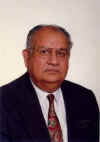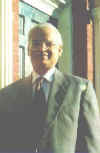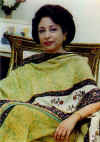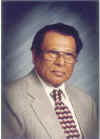|
Issue
5 / 2000
South Asian Ambassadors in
DC




L-R: Mr. Naresh Chandra, Mr. D. P. Gautam,
Dr. Maleeha Lodhi, Dr. W. Rasaputram
Just a few days prior to the
new millennium, the-south-asian met with the Ambassadors of India,
Nepal, Pakistan
and Sri Lanka - in
Washington DC. In our brief conversations with them, published in this
issue, they share their views, beliefs, interests, and hopes, with the
readers. One significant view they all share is that South Asia must be a
part of the globalisation thrust and that regional conflicts ought to be
resolved.
Delhi
- resilient forever
 In
the first of a series on historic South Asian cities, this article documents
the milestones in the last 1000 years of Delhi's 3000 year old, or
more, history. Delhi remains one of the oldest surviving cities in the world today. It has
evolved into a culturally secular city – absorbing different religions,
diverse cultures, both foreign and indigenous, and yet functioning as one In
the first of a series on historic South Asian cities, this article documents
the milestones in the last 1000 years of Delhi's 3000 year old, or
more, history. Delhi remains one of the oldest surviving cities in the world today. It has
evolved into a culturally secular city – absorbing different religions,
diverse cultures, both foreign and indigenous, and yet functioning as one organic entity. Foreign travellers were hypnotised by it – books have been written on
it since time immemorial, poets have loved it and Kings and Emperors have
fought over it. The city has a history of resilience – plundered, looted
and destroyed several times over by central Asian and Persian rulers – the
city always returned to its cultural sophistication.This is the first of
three parts on Delhi to appear over the next two issues of 'the-south-asian'.
organic entity. Foreign travellers were hypnotised by it – books have been written on
it since time immemorial, poets have loved it and Kings and Emperors have
fought over it. The city has a history of resilience – plundered, looted
and destroyed several times over by central Asian and Persian rulers – the
city always returned to its cultural sophistication.This is the first of
three parts on Delhi to appear over the next two issues of 'the-south-asian'.
Sunil
Dutt - adding meaning to life
 In
this exclusive interview with 'the-south-asian' - Dutt Sahib relates his
life experiences from the time he left his ancestral village Khurd (now in
Pakistan) in 1947 to the time he went back on a visit - 50 years later. It
was an emotional homecoming for Balraj - the name his village-folk still
remembered him by. Dutt Sahib, as he is affectionately known, went to Bombay
as a student, became a film journalist, and then a mega star in Indian
films. His aspirations did not end there. He has been constantly on the move
- be it flying to Leh to entertain the soldiers, walking from Bombay
to Amritsar for peace in Punjab, driving through South Asian countries for
peace in the region, rushing to Birmingham to help Imran Khan raise funds
for his cancer hospital in Lahore, or jetting to Kenya to raise funds for a
hospital in Nairobi. When he is in Bombay - he is seldom home. He is either
helping the slum-dwellers or leading a campaign on AIDS in the red
light districts - a man with a mission. A doer. In
this exclusive interview with 'the-south-asian' - Dutt Sahib relates his
life experiences from the time he left his ancestral village Khurd (now in
Pakistan) in 1947 to the time he went back on a visit - 50 years later. It
was an emotional homecoming for Balraj - the name his village-folk still
remembered him by. Dutt Sahib, as he is affectionately known, went to Bombay
as a student, became a film journalist, and then a mega star in Indian
films. His aspirations did not end there. He has been constantly on the move
- be it flying to Leh to entertain the soldiers, walking from Bombay
to Amritsar for peace in Punjab, driving through South Asian countries for
peace in the region, rushing to Birmingham to help Imran Khan raise funds
for his cancer hospital in Lahore, or jetting to Kenya to raise funds for a
hospital in Nairobi. When he is in Bombay - he is seldom home. He is either
helping the slum-dwellers or leading a campaign on AIDS in the red
light districts - a man with a mission. A doer.
Introducing 'Technology
Trends'
'Technology & Trends'
will be a regular section henceforth. This issue looks at the latest in:
Optical
Networks
B2B & The Killer
Application
Genomics
- decoding genes
The
Mughals - a family album
 The
Mughals ruled India for over 300 years. Each ruler left a lasting impression
- in terms of policies, art, architecture, and military campaigns. Their
rule ranged from one of extreme tolerance to one of extreme orthodoxy. They
had intellectual leanings, their courts were rigid in sophistication and
formality, yet - only the Throne mattered not the ties of blood. Brothers
were murdered, fathers and sons imprisoned - by the same rulers who
felt passionately about aesthetics. The one-pagers give information on them
as individuals - their strengths and weaknesses, and likes and
dislikes. The
Mughals ruled India for over 300 years. Each ruler left a lasting impression
- in terms of policies, art, architecture, and military campaigns. Their
rule ranged from one of extreme tolerance to one of extreme orthodoxy. They
had intellectual leanings, their courts were rigid in sophistication and
formality, yet - only the Throne mattered not the ties of blood. Brothers
were murdered, fathers and sons imprisoned - by the same rulers who
felt passionately about aesthetics. The one-pagers give information on them
as individuals - their strengths and weaknesses, and likes and
dislikes.
Disclaimer |







 The
Mughals ruled India for over 300 years. Each ruler left a lasting impression
- in terms of policies, art, architecture, and military campaigns. Their
rule ranged from one of extreme tolerance to one of extreme orthodoxy. They
had intellectual leanings, their courts were rigid in sophistication and
formality, yet - only the Throne mattered not the ties of blood. Brothers
were murdered, fathers and sons imprisoned - by the same rulers who
felt passionately about aesthetics. The one-pagers give information on them
as individuals - their strengths and weaknesses, and likes and
dislikes.
The
Mughals ruled India for over 300 years. Each ruler left a lasting impression
- in terms of policies, art, architecture, and military campaigns. Their
rule ranged from one of extreme tolerance to one of extreme orthodoxy. They
had intellectual leanings, their courts were rigid in sophistication and
formality, yet - only the Throne mattered not the ties of blood. Brothers
were murdered, fathers and sons imprisoned - by the same rulers who
felt passionately about aesthetics. The one-pagers give information on them
as individuals - their strengths and weaknesses, and likes and
dislikes.